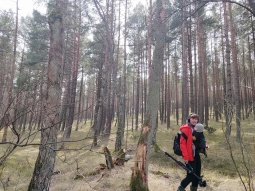Art of reparative reading for future ecologies
commented tour
Tuesday, 7 June 2022, 6 pm.
We invited Agata Marzecová, who works in the interdisciplinary field between arts and natural sciences, to see our exhibition, read it, and contribute with her point of view as a researcher. Agata will guide us through the exhibition and address the challenges of today's spectatorship in encountering ecopolitical art, while she’ll propose “reparative reading” as an interpretative tool.
Ecopolitical art not only visualizes environmental problems, importantly, it requires a critical reassessment or perhaps ecologization of thinking, practices, institutions. In other words, recognizing the political dimension of ecology in gallery settings requires considering it not only in a thematic focus of exhibitions or through the artwork aesthetics, but also in the exhibition form as such. For instance, exhibitions are tasked to become places of unlearning, public debate, and building collectivity. Arguably, some of the political work in such an exhibition falls onto the spectators or visitors who must decide how to critically consider a project which does not want to enchant with originality, but wants to cultivate new values and worlds. In my commentary, I would like to explore the notion of reparative reading, which was originally formulated by Eve Kosofsky Sedgwick, as one of the useful starting points for cultivating ecopolitical modes of art spectatorship.
Agáta Marzecová (1981, SK / EE) is an interdisciplinary researcher. Her practice is situated at the intersection of science, art, and ecology. Currently, she is working on an collaborative research project Towards Atmospheric Care, which brings together ecofeminist principles and concern for the air and atmosphere.
ERSTE Foundation is main partner of tranzit. Supported using public funding by Slovak Arts Council.
